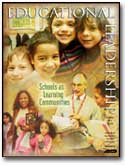Many schools today promote the attractive vision of becoming a learning community, but what exactly is a learning community? As Richard DuFour notes, this in-vogue term is used by different people to mean very different things. The May 2004 issue of Educational Leadership offers a variety of perspectives on what constitutes a learning community and provokes serious thought about how to foster community in your own school.
Learning for All
In learning communities, student learning and achievement is the top priority. Richard DuFour writes that when schools shift their focus from ensuring that students are taught to ensuring that students learn, staff members begin to work collaboratively to find what practices really help students achieve at high levels. Discuss with your colleagues whether members of your school have a common understanding of what students are expected to learn and of how they are assessed. DuFour asserts that teachers in a professional learning community accept that ensuring learning for all students means providing immediate, directive intervention for students who are falling behind. Do you agree? How does your school respond to struggling students, and what kind of extra support do they receive? Do you believe it's enough? With your colleagues, discuss some ways to ensure that these students don't fall farther behind.
Everyone seems to agree that learning communities must foster learning for everyone, adults as well as students. According to Dennis Littky and colleagues, staff members at The Met high school participate in every facet of the learning cycle and recognize that they, like their students, always have room for improvement. Met students and staff alike have personalized Learning Plans, and staff members constantly model lifelong learning for students. Think about ways you model learning for your students. Do you and your colleagues share information with one another in front of students? Do you let students know that you, too, are continually learning?
Student Voice
- Dennis Littky and colleagues describe how The Met provides students with concrete ways to take part in problem solving, decision making, and day-to-day running of the school. For example, students in one of The Met's six Small Learning Communities facilitate regular Town Meetings—whole-school discussions that center on topics of interest to students, such as gossip, theft, and violence.
- Edith E. Beatty writes about one of 11 First Amendment Schools across the United States. Fairview Elementary School encourages student activism by teaching students how to put the democratic process into action. For example, students draft petitions and participate in debates on such topics as school lunches and school uniforms. Such activities enable students to become civically engaged and deal with issues that directly affect them.
Professional Collaboration and Support
Professional collaboration and support are essential to building learning communities. Unfortunately, however, teachers in many schools continue to work in isolation. This situation can lead to a competitive culture in which teachers are reluctant to share their strengths and fear acknowledging their weaknesses. According to Richard DuFour, schools must give teachers the time and opportunity to collaborate, and teachers must stop making excuses for their failure to collaborate.
Cynthia L. Carver describes Club Maroon, a high school program that is both a teacher support group and a professional learning community. The group provides a safe place for teachers to open up their practice to their peers and freely discuss questions and concerns, successes and failures. Do you meet with your colleagues to discuss classroom practice? What elements of your practice would improve through collaboration? Members of Club Maroon share successful instructional strategies and work to set standards and create common assessments. Do you believe that these activities make the best use of such a group's time? What other issues and subjects do you think are important?
Cynthia Simon Millinger claims that mentoring new teachers is a crucial step in countering teacher isolation and attrition. The framework for her highly structured mentoring program is based on four principles: Codevelopment and collaboration, Observation and feedback, Policies and systems, and Encouragement and support (COPE). Does your school have a mentoring program? How has your experience as either a mentor or mentee affected your practice? Do you agree with the principles of COPE? What other areas do you think mentoring programs should address?
Family and Community Involvement
- Lamson T. Lam's family test preparation workshops increase parent involvement in student learning while preparing students for high-stakes tests. By handing more responsibility to parents, the workshops strengthen and expand the school's learning community and give teachers more class time to focus on rich content.
- Michaela W. Colombo describes the Parent Partnership for Achieving Literacy program, designed to improve the education opportunities of culturally and linguistically diverse students by increasing communication between school and home. This program sponsors such activities as Family Literacy Night, during which staff reads storybooks to students and models reading strategies for parents.
- Asena L. Mott writes about Tomorrow's Leaders Connect, a pen pal program that matches students with community leaders to foster school-community connections and build students' reading and writing skills.
- E. Francine Guastello describes Project TIE (Training Innovative Educators), an initiative that focuses on improving literacy instruction and achievement. The program teaches parents to motivate their children to higher achievement by building parents' knowledge of the writing process, of writing assessment, and of how state standards affect their children's learning.
